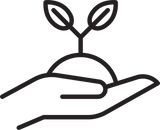Healing PCOS Naturally: A Root-Cause, Whole-Body Approach with Herbs, Nutrition, and Lifestyle
Before You Begin: This guide is not meant to overwhelm you—it’s here to empower you. Healing takes time, and small steps add up. Let this post be something you return to again and again. Each time you read it, you may find something new. Take what resonates today, and return to the rest when ready.
Polycystic Ovary Syndrome (PCOS) is one of the most common hormonal imbalances affecting women today. Yet despite how widespread it is, many still struggle to find real solutions beyond birth control pills and temporary fixes. Rooted in both metabolic and hormonal dysfunction, PCOS requires a deeper and more holistic approach—one that honors the body as a whole, living system.
Before we get into herbs, supplements, and protocols that can help, we want to clarify that improving your PCOS starts with the foundations.
We call these the Pillars of Health:
-
Sleep is essential for repair, detoxification, and hormone regulation
-
Nervous System Regulation – supports cortisol balance and parasympathetic activation
-
Nutrition & Digestion – enables nutrient absorption and metabolic function
-
Movement – promotes blood flow, lymphatic drainage, and insulin sensitivity
And we will go over these in more detail later. You can take all the herbs and supplements worldwide, but without strong foundations, the body will struggle to find balance or repair itself. PCOS isn’t something you fix once and never think about again—it calls for a new way of living. One that keeps symptoms at bay by consistently supporting your body through the core pillars of health.
Let’s discuss PCOS more through the lenses of functional medicine, modern research, and traditional herbalism. This is the sort of “dream team” when it comes to managing PCOS naturally by addressing the root cause.
What is PCOS?
Polycystic Ovary Syndrome (PCOS) is a hormonal and metabolic disorder that affects up to 1 in 10 women of reproductive age. While its expression can vary widely, PCOS often includes:
-
Irregular or missing periods
-
Excess androgen levels (leading to acne, hair growth, and hair loss)
-
Ovarian cysts or polycystic ovaries
-
Insulin resistance or blood sugar dysregulation
-
Fertility challenges
Modern research increasingly recognizes that PCOS is not just a reproductive or ovarian issue but a complex, systemic condition involving:
-
Insulin resistance and blood sugar imbalance – Affects about 70% of women with PCOS, even those who are not overweight.
-
Chronic inflammation – Low-grade inflammation is common in PCOS and contributes to insulin resistance and ovarian dysfunction.
-
Stress and HPA axis dysregulation – Elevated cortisol and adrenal androgen production are especially relevant in “Adrenal PCOS.”
-
Gut health imbalances – Research links PCOS with altered gut microbiota, increased intestinal permeability, and gut-derived inflammation.
-
Environmental toxin exposure – Endocrine-disrupting chemicals (like BPA, phthalates) are suspected contributors to PCOS symptoms and hormonal dysregulation.
Root Causes of PCOS: A Functional Medicine View
Drawing from the work of Dr. Sara Gottfried and Dr. Jolene Brighten, we now understand that PCOS isn't a one-size-fits-all diagnosis. Instead, it presents in several subtypes:
-
Insulin-Resistant PCOS – the most common form, driven by blood sugar issues.
-
Post-Pill PCOS – triggered after coming off hormonal birth control.
-
Inflammatory PCOS is marked by chronic systemic inflammation.
-
Adrenal PCOS – where DHEA-S is elevated from stress/adrenal dysfunction.
Each subtype may require different support strategies, but the same pillars of digestive and liver health, sleep quality, stress regulation, and body movement apply to all.
Herbal Approaches to PCOS: Wisdom from the Plant World
Herbalism can offer powerful support for PCOS, especially once you understand what’s happening in the body. Let’s explore some of the most supportive herbal allies, organized by category, to help you find what fits your unique needs.
Nutritive Herbs: Rebuilding the Foundation
Many women with PCOS experience nutrient depletion, often due to chronic inflammation, poor absorption, blood sugar issues, restrictive dieting, or long-term use of hormonal birth control. On top of that, our modern food system isn’t what it used to be. Soil depletion and industrial agriculture have significantly reduced the mineral content of our food, making it harder to get the deep nourishment our bodies need through diet alone.
Nutritive herbs offer a gentle yet powerful solution. These plants are rich in easily absorbed vitamins, minerals, and phytonutrients that help rebuild the body’s reserves and support healing at a cellular level. Regular infusions, tonics, or teas nourish the nervous system, strengthen the adrenals, and lay the foundation for hormone balance and resilience.
-
Nettle Leaf – High in iron, calcium, magnesium, potassium, and vitamin C.
-
Oatstraw – A rich source of B-complex vitamins, silica, calcium, and magnesium.
-
Red Raspberry Leaf – Contains iron, manganese, magnesium, and vitamins C and E.
-
Alfalfa – Packed with vitamins A, C, E, and K, plus trace minerals like copper, zinc, and selenium.
-
Dandelion Leaf – Excellent source of potassium, calcium, iron, and trace minerals source.
How to Make a Nourishing Herbal Infusion:
Add 1 oz (about 1 cup) of dried herbs to a quart-sized jar. Cover with boiling water, steep for 4–8 hours, strain, and sip throughout the day.
Herbs for Hormonal Regulation
These herbs help support hormone balance by encouraging ovulation, regulating cycles, and promoting a healthy estrogen-progesterone ratio. They can be invaluable for addressing irregular periods, low progesterone, and symptoms of androgen excess.
-
Vitex (Chaste Tree Berry) – Supports progesterone and cycle regularity.
-
White Peony & Licorice Root – Lower androgens and support ovulation.
-
Shatavari – Ayurvedic tonic for female hormone balance.
Herbs for Blood Sugar Support
Blood sugar balance is at the core of PCOS support. These herbs help improve insulin sensitivity, support metabolic function, and reduce androgen excess, which is often driven by insulin resistance.
-
Cinnamon (Ceylon) – Enhances insulin sensitivity.
-
Berberine (Compound found in herbs like Oregon Grape root) – Improves insulin resistance; comparable to Metformin.
-
Spearmint – Reduces free testosterone levels in PCOS.
Herbs for Liver Support & Hormone Metabolism
The liver is your hormone processing center. It helps break down and clear excess hormones like estrogen and androgens. These plants have long been used to support and strengthen liver function, helping ease symptoms like PMS, hormonal acne, and fatigue.
-
Dandelion Root, Burdock, Milk Thistle – Aid in estrogen detox.
-
Schisandra Berry – Adaptogen for liver, stress, and hormone balance.
Herbs for Inflammation & Stress Support
Chronic stress and low-grade inflammation are often the underlying drivers of PCOS symptoms. These herbs help regulate cortisol, calm the nervous system, and ease tension, creating the internal environment your body needs to rebalance itself.
-
Holy Basil, Ashwagandha, Rhodiola – Cortisol-lowering adaptogens.
-
Chamomile, Skullcap, Lemon Balm – Calming nervines for mood and sleep.
Lifestyle Practices for Holistic Hormone Healing
Lifestyle plays a central role in hormone regulation and PCOS management. While herbs are powerful tools, they work best when paired with other supportive lifestyle practices. These foundational habits—rooted in functional medicine and ancestral wisdom—help regulate hormones, improve metabolic function, and bring the body back into balance.
1. Balance Blood Sugar
Blood sugar stability is one of the most essential foundations for managing PCOS. Spikes and crashes in glucose can drive insulin resistance, increase androgens, worsen cravings, and throw off your delicate hormones. Supporting stable blood sugar helps improve energy, mood, skin, metabolism, and cycle regularity.
How to get started:
-
Eat protein within 30–60 minutes of waking
This can help stabilize your blood sugar and cortisol levels for the rest of the day, keeping you off the dreaded blood sugar rollercoaster. -
Build meals with protein, fat, and fiber.r
These three macronutrients slow glucose absorption and help keep you full and energized for longer. -
Minimize sugar and refined carbohydrates.
Reduce or avoid white bread, pastries, sugary snacks, and soda—especially on an empty stomach. Focus on whole, nutrient-dense sources of carbohydrates like root veggies, squash, and fruit (paired with fat or protein). -
Walk after meals
A 10–15 minute walk can help lower post-meal glucose spikes and improve insulin sensitivity.
2. Regulate Stress
Chronic stress is one of the most overlooked drivers of hormone imbalance and PCOS symptoms. Daily support of your nervous system helps regulate stress hormones like cortisol, support ovulation and menstrual cycle regularity, and bring your body back into a healing state.
Here are some ways to begin:
-
Breathwork for regulation: Try slow belly breathing, extended exhales, or box breathing to activate the parasympathetic (rest-and-digest) state. Even 2–5 minutes daily can help shift your internal state and reduce cortisol output.
-
Vagus nerve toning: Try humming, gargling, singing, cold exposure, or gentle neck stretches. These stimulate the vagus nerve, significantly regulating inflammation, digestion, and mood.
-
Nervine and adaptogenic herbs: Herbs like skullcap, lemon balm, holy basil, and ashwagandha help calm and regulate the nervous system. This creates a beautiful two-fold benefit—you get direct support from the herbs themselves, and from preparing and sipping tea. Taking time to slow down, brew a cup, and be present with it is healing in its own right.
-
Create a “safe” environment for your body: Go to bed simultaneously, limit blue light at night, and spend time away from screens or pressure. Nervous system healing happens in predictable, calm environments—help your body trust that it's not in survival mode anymore.
-
Nature + Earth connection: Step outside, touch a tree, sit on the grass, or walk barefoot. Nature regulates your nervous system in ways we’re only beginning to understand. It lowers cortisol, calms the mind, and reminds your body what it feels like to be grounded and safe.
3. Prioritize Sleep
Here’s how to support better sleep:
-
Aim for 7–9 hours of restful sleep each night: Deep, consistent sleep supports ovulation, reduces cravings, balances cortisol, and restores energy.
-
Keep a consistent bedtime and wake time: Going to bed and waking up simultaneously each day (even weekends) helps anchor your circadian rhythm and hormone cycles.
-
Avoid blue light and screens 1–2 hours before bed. Blue light suppresses melatonin, your body’s natural sleep hormone. Swap screens for books, baths, or calming herbal tea in the evening.
-
Incorporate calming herbal support: Herbs like chamomile, passionflower, and valerian help quiet the mind and ease you into deeper sleep. Sip a tea or take a tincture 30–60 minutes before bed to support your nighttime routine.
4. Support Detoxification
Detoxification isn’t about juice cleanses or extreme protocols—it’s about helping your body do what it’s already designed to do. Your liver, lymph, skin, and digestive system are constantly working to filter and eliminate excess hormones, toxins, and metabolic waste. But in today’s world, that natural detox system often gets overwhelmed.Gentlee, daily detox is essential for hormone balance, especially for clearing excess estrogen, improving skin, and reducing inflammation.
Here’s how to get things moving:
-
Daily bowel movements: Estrogen is processed by the liver and eliminated through the bowels. If you’re not pooping daily, those hormones can recirculate and cause symptoms like PMS, bloating, acne, or breast tenderness. Hydration, fiber, movement, and magnesium can all help.
-
Herbal bitters before meals: Bitters like dandelion, gentian, or artichoke stimulate digestive juices and bile flow, which support liver function and hormone metabolism. Try a few drops before meals to improve digestion and detox pathways.
-
Dry brushing, sweating, and castor oil packs: These simple practices support lymphatic flow and skin detox. Dry brushing helps stimulate circulation and exfoliation; sweating (via exercise or sauna) supports elimination; castor oil packs over the liver or lower abdomen encourage flow, reduce stagnation, and ease inflammation.
5. Move Your Body
Movement is one of the most potent ways to support hormone balance, but it doesn’t have to be intense or exhausting to be effective. For women with PCOS, the right kind of movement can improve insulin sensitivity, reduce inflammation, support detox, and ease stress—all without overloading the nervous system or disrupting hormone production.
The goal isn’t to burn out your body. It’s to work with it.
Here’s how to approach movement with intention:
-
Daily walking: Walking is one of the most underrated tools for hormone health. 20–30 minutes daily can improve insulin function, support lymphatic flow, reduce cortisol, and help regulate your cycle.
-
Strength training, yoga, or gentle cardio: Muscle-building exercises help improve metabolic health and support testosterone balance. Yoga and low-impact movement ease tension and build body awareness. High-intensity workouts are okay for some, but only if stress and sleep are well supported.
6. Eat for Hormone Balance
Food is one of the most potent forms of daily medicine, especially when working to support hormones, improve blood sugar, and reduce inflammation.
Here’s how to build meals that work with your hormones:
-
Prioritize real, whole foods: Grass-fed meats, wild-caught fish, organic vegetables, healthy fats, bone broth, and pastured eggs are excellent, nutrient-dense staples. And these foods give your body the building blocks it needs to produce and metabolize hormones properly.
-
Focus on fiber-rich foods: Flaxseeds, chia, leafy greens, lentils, and cruciferous veggies (unless contraindicated) help support estrogen detox, feed beneficial gut bacteria, and stabilize blood sugar.
-
Include fermented foods: Add small servings of sauerkraut, kimchi, yogurt, kefir, or fermented veggies. These boost beneficial microbes in the gut, which play a significant role in hormone balance, mood, and metabolism.
-
Make meal planning and prep a priority: Planning reduces stress, reduces decision fatigue, and helps you stay nourished even on busy days. Try batch-cooking proteins and veggies, keeping simple blood sugar–friendly snacks on hand, and stocking your pantry with healing staples.
Take It Slow
If you’re reading this and feeling overwhelmed, pause and breathe. You don’t have to do everything at once.
Start where you are. That could mean adding cinnamon to your morning oats or swapping your afternoon coffee for a mineral-rich tea. These simple shifts build the foundation.
This blog isn’t meant to be a checklist—it’s a resource to return to again and again. Save it. Re-read it next week, next month, next season. Each time you revisit it, something new will resonate.
Give Yourself Grace
There is no perfect PCOS protocol.
Your body is unique. Your healing path is your own.
Sometimes, we become so focused on fixing ourselves that we forget to honor how far we’ve come. PCOS is a message from your body, ot a life sentence. And it’s not your fault.
True healing happens when we move from punishment to partnership with our bodies. That means learning to rest without guilt, choosing nourishment over restriction, listening deeply to your needs, and giving yourself permission to feel good again.
Let ease be your guide. Let joy be part of your protocol. Healing isn’t about doing mor butt coming home to yourself.
References + Additional Resources
-
Dr. Jolene Brighten – Beyond the Pill
-
Dr. Sara Gottfried – The Hormone Cure
-
Rosemary Gladstar – Herbal Healing for Women
-
Maria Noël Groves – Body into Balance
One more note: The internet can be noisy. With so much advice and many stories, it’s easy to feel overwhelmed or discouraged.
Speaking from experience, sometimes the most helpful thing you can do is turn the volume down or even off completely. Find one resource—or maybe just a few—that you trust and that feels aligned with where you are in your journey. Then unfollow the rest, unsubscribe, and mute.
Don’t make things any harder on yourself by creating confusion, doubt, or extra mental work.













Leave a comment